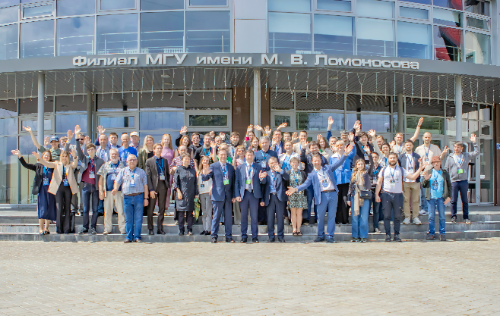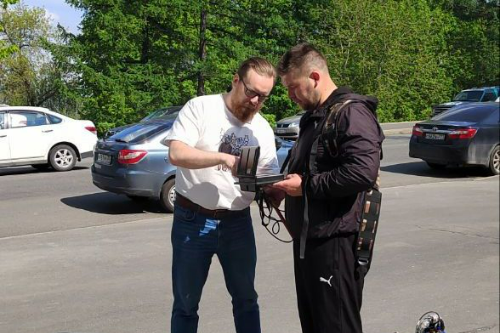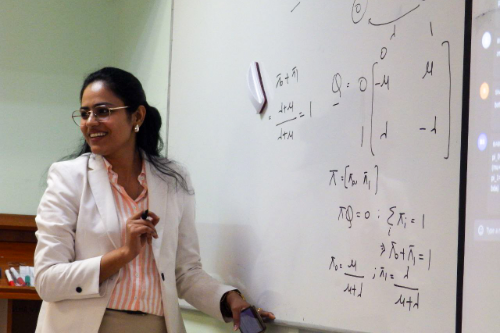Specifically, Chief Researcher at NWPI KarRC RAS, Corr. Academician Nikolai Filatov talked about the problems of anthropogenic eutrophication of Eurasian lakes and advancements in water management systems. His explanations of the eutrophication and contamination of Eurasian lakes are the growing human pressure, climate change, and a faulty economic system. Things have to be arranged so that nature conservation and restoration are perceived by the economy not as costs but as a target and mission of economic activities. The scientist described an information analytical system designed for lakes of Russia using Lake Onego as the case study. It is made up of coupled lake-catchment models which can be used to assess the current situation and predict seasonal and long-term changes in the ecosystem.

Webinar moderator – Head of Geography and Hydrology Laboratory at NWPI KarRC RAS Aleksey Tolstikov; Corr. Academician Nikolai Filatov delivering online. Photo: Yu. Novikova / NWPI KarRC RAS
Senior Researcher of DMR KarRC RAS Dmitry Yekimov introduced a new device for measuring soil carbon dioxide fluxes. The soil chamber and the controller integrated within the device help measure the CO₂ flux, air temperature, pressure, humidity, soil temperature and field capacity. Fieldwork takes less time and error probability is reduced. The device is currently going through trials and verification.
The topic covered by the Head of Geography and Hydrology Laboratory at NWPI KarRC RAS Aleksey Tolstikov was the study of the coastal ecosystem of Solovetsky Archipelago, White Sea under human impact and climate change. Last year, scientists established a sampling grid, mapped the hydrodynamic regime in the bay, determined the parameters of the planktic community, and assessed the water quality. They highlighted an increase in human pressure over the past 30 years. The work was continued this year: three expeditions were held, including one during the winter. Scientists are currently analyzing the collected data to understand what shapes the environment in this part of the White Sea water area. The feasibility of monitoring the bay by remote sensing is being considered.
Head of the Zoology Laboratory at IB KarRC RAS Konstantin TIrronen talked about remote sensing methods in the study of rare species in Arctic ecosystems, using the polar fox as the example. This species is endangered on the Kola Peninsula. Scientists interpret satellite images to spot potential denning sites and then check them out in the field. This approach cuts the costs of labor-intensive and expensive surveys in hard-to-reach tundra areas and boosts efficiency. The zoologist stressed the need for conservation actions to protect the polar fox and its habitats.

Head of Zoology Laboratory at IB KarRC RAS Konstantin Tirronen delivers his talk. Photo: A. Tolstikov / NWPI KarRC RAS
Another speaker to present the studies of the Zoology Laboratory was Tatyana Yanchenko. Her topic was the long-term abundance dynamics of finches (Fringillidae) in the changing environment.
This webinar was part of the collaboration between the Karelian Research Centre RAS and the Russian National Committee on BRICS Research. KarRC RAS has for several years been actively developing contacts with academic institutions in BRICS+ countries. Namely, joint work with the Chinese Academy of Sciences is underway, several visits to China and to Karelia have taken place, joint project applications have been prepared. In 2025, Memorandums of Understanding were signed with Chanakya University and Bundelkhand University of India.
– In 2023 and 2024, KarRC RAS hosted the conferences “Regional Cooperation within the BRICS”, which mostly focused on ecology and environment issues. This webinar is the second among the joint events held by KarRC RAS in follow-up of these conferences. Partners from China and India now constantly participate in the events organized by KarRC RAS to promote the BRICS cooperation. Other active participants of the conferences and webinars are colleagues from Belarus – a BRICS partner country, – shared Aleksey Tsvetkov, Director of the Center for BRICS Cooperation at KarRC RAS.
Concluding the webinar, its participants agreed to have more joint events and continue sharing information of mutual interest. Scientists from the Institute of Geographic Sciences and Natural Resources Research of the Chinese Academy of Sciences proposed to set up contacts on specific topics with the Northern Water Problems Institute KarRC RAS and partners from the Institute of Biology of the Southern Seas RAS are willing to work on joint initiatives with the Centre for Water Resources Development and Management from India.






